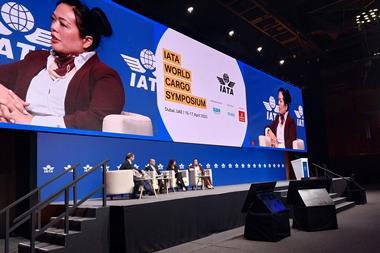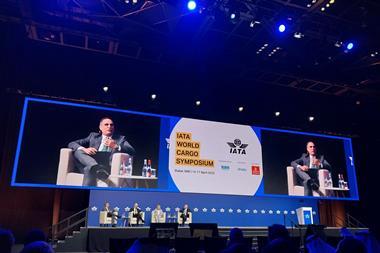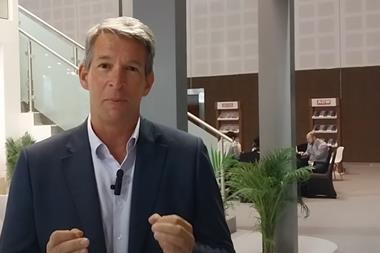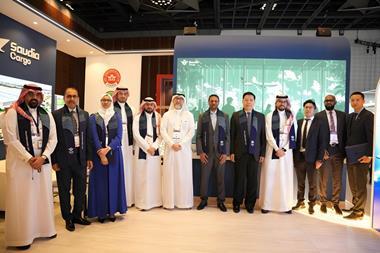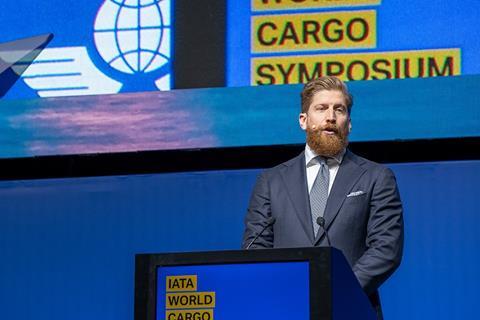
Speaking at the opening of the currently underway 18th World Cargo Symposium (WCS) in Dubai, Brendan Sullivan, IATA’s global head of cargo, called on governments and industry to remain focused on delivering the fundamental expectations of customers within the airfreight industry – namely safety and security, digitalisation and sustainability.
Sullivan declared: “Whether supporting global trade, enabling e-commerce, or delivering vital humanitarian aid, the value of air cargo has never been clearer.
“To meet customer expectations and navigate an increasingly complex environment, the air cargo industry must continuously strengthen safety and security, fast-track digitalisation and deliver on its sustainability commitments.”
Safety
Safety, as ever, remains the top priority for those involved in air transport, and in this regard the safe transport of lithium batteries is a particular focus. IATA is looking to governments to increase their efforts to stop rogue shippers and to support ICAO’s work to strengthen Annex 18 of the Chicago Convention – the global framework for the safe transport of dangerous goods by air.
Sullivan said: “Shipments of lithium batteries are growing in volume. With that come increased risks associated with undeclared or mis-declared goods.
“The industry has invested in training, certification and technology. Governments must match that commitment with robust oversight and enforcement.”
Security
Security is another IATA priority. It is calling on governments to foster a coordinated, risk-based approach to air cargo security given the recent incidents involving incendiary devices concealed in shipments.
While some countries have put in place preventative-type measures, the lack of alignment has led to inconsistent outcomes, IATA believes.
“Recent security incidents highlight the need for better coordination among governments. Aviation security cannot be built on fragmented or reactionary measures. Global standards and cooperation are essential,” Sullivan observed.
He also urged countries to share threat intelligence to enable the relevant bodies to make informed risk assessments and operational decisions.
“The industry is best placed to understand its operations and the associated safety and security risks,” Sullivan said.
“But governments have infinitely more resources, particularly in intelligence gathering. The best results come when governments and industry work together,” he added.
Digitalisation
IATA continues to promote its ONE Record standard for data sharing, believing its protocols for end-to-end digital data exchange facilitate improved efficiency, compliance and transparency in the air cargo industry.
IATA Is wanting to see ONE Record become the preferred method of sharing data in the sector by January 2026.
Sullivan noted: “ONE Record is a foundational shift in how we share, manage and trust data across the supply chain.
“Airlines representing 72% of global air waybill volume are on track to implement it. More than 100 IT providers and 10,000 freight forwarders are already aligned.”
But: “To achieve full value, implementation must accelerate across all stakeholders, and governments must recognise ONE Record in their regulatory frameworks,” he said.
Sustainability
The air cargo industry is making progress on the subject of sustainability, with efforts to reduce waste, implement circular practices and phase out single-use plastics all becoming more commonplace, IATA considers.
Progress is also being made on the industry’s biggest largest environmental challenge – that of minimising carbon emissions. The viability of sustainable aviation fuel (SAF) is becoming more apparent, with new agreements across the value chain and more companies committing to SAF use.
However, SAF volumes remain far below what is needed, and production costs remain high, and IATA is calling for governments to implement policy frameworks to scale up SAF production and reduce costs.
Sullivan stated: “We are committed to net zero carbon emissions by 2050. But the ramp-up of SAF – our strongest lever – has been disappointing.
“The major fuel producers have been slow-walking – or sidelining – planned investments in SAF. Aircraft manufacturers have backed off their commitments for medium-term delivery of CO2 saving products such as hydrogen-powered aircraft. And governments have not provided the policy support needed, even though they have a playbook at hand with how the wind and solar energy industries expanded.
“Instead, they send mixed signals by subsidising fossil fuel extraction while aiming for net zero.
“Airlines are committed and determined but we cannot do it alone. We need action behind the words of regulators, fuel suppliers and manufacturers,” Sullivan advised.
Trade and tariffs
Amid increasing uncertainty in global markets amid rapid changes in tariff environments, IATA reinforced its view that free trade drives economic growth.
“Current trade tensions are deeply concerning,” Sullivan said.
But, more positively, he concluded: “Trade drives prosperity. The more the world trades, the better off we all are.
“So, whatever the resolution of current trade tensions is, we know that air cargo will be there to deliver the goods people need and want.”
WCS
IATA’s WCS runs between 15 and 17 April this week and is being held at the Dubai World Trade Center.
This year’s event focuses on three pillars:
· Digitalisation: The role of Artificial Intelligence (AI), automation and data transparency in optimising cargo operations
· Sustainability: Accelerating decarbonisation efforts, reducing waste and implementing circular economy practices
· Risk & Resilience: Strengthening the industry’s ability to adapt to geopolitical shifts and regulatory changes
As noted above, these priorities are all important IATA priorities right now.





